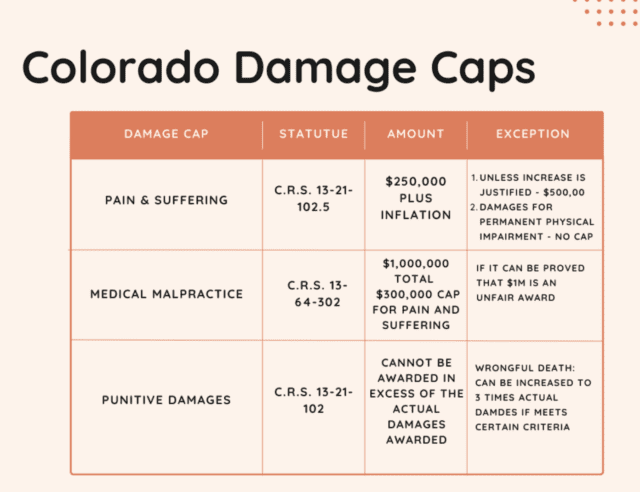Negligence is a critical concept that forms the basis of many legal claims. While ordinary negligence sets the standard for reasonable care, there are situations that call of a higher degree of accountability. This is where “gross negligence” enters the legal picture.
Understanding what constitutes gross negligence and its implications within the legal framework is essential for both plaintiffs and defendants involved in personal injury claims. To better explain what gross negligence means as it relates to personal injury law in Colorado, our lawyers will discuss what gross negligence is, what elements are required to prove gross negligence, examine its significance in various scenarios, and shed light on the potential consequences it can have on personal injury cases.
- What is gross negligence and how is it different from ordinary negligence?
- How do you prove gross negligence?
- What are the potential consequences of gross negligence in personal injury cases?
- What is gross medical negligence?
- Can you sue your employer for gross negligence?
1. What is gross negligence and how is it different from ordinary negligence?
“Gross Negligence” refers to a higher level of negligence beyond ordinary negligence. (see here for glossary link to negligence?) Gross negligence is a legal term used to describe conduct that demonstrates a willful or reckless disregard for the duty owed to others, resulting in substantial risk of harm. Ordinary negligence, on the other hand, refers to the failure to exercise reasonable care.
Examples of gross negligence include:
- Drunk driving: If a person chooses to drive under the influence of alcohol or drugs, knowing the risks and potential harm to others, and causes an accident resulting in injuries or death, it can be considered gross negligence.
- Medical Malpractice: A healthcare professional who knowingly and intentionally disregards established medical standards, resulting in serious harm or death to a patient, may be found to be grossly negligent.
- Reckless behavior: Engaging in extremely dangerous activities, such as excessive speeding, street racing, or performing stunts, without regard for the safety of others can be considered gross negligence if it leads to an accident.
2. How do you prove gross negligence?
Proving gross negligence requires establishing that the defendant’s conduct demonstrated a willful or reckless disregard for the safety of others. While the specific elements and burden of proof may vary depending on the case, here are some key elements to consider:
- Conscious disregard: It must be shown that the defendant was aware of the risks associated with their conduct but chose to ignore them, displaying a conscious disregard for the safety of others. This can be established through evidence such as statements, actions, or precious incidents indicating knowledge of the potential harm.
- Departure from the standard of care: It is crucial to prove that the defendant’s conduct significantly deviated from what a reasonable person or professional would have done under similar circumstances. Expert testimony can play a crucial role in establishing this breach of standard of care.
- Causation: It is required to establish a direct link between the defendant’s grossly negligent conduct and the plaintiff’s injuries. There are two key elements of causation: cause in fact, and proximate cause
- Cause in fact: The plaintiff must show that the grossly negligent conduct was the actual cause of their injuries. This requires demonstrating that, but for the defendant’s actions or omissions, the plaintiff would not have suffered harm. It involves proving a direct cause and effect relationship between the defendant’s actions and the injuries sustained.
- Proximate cause: This is also known as ‘legal cause’ and refers to presenting evidence, such as expert testimony, that can establish a causal link between the defendant’s conduct and the plaintiff’s injuries.
3. What are the potential consequences of gross negligence in personal injury cases?
If a person is found to be grossly negligent in a personal injury case, they may be subject to higher damages, including punitive damages. Punitive damages are intended to punish the defendant and deter others from engaging in similar negligent conduct.

4. What is gross medical negligence?
Gross medical negligence refers to an extremely high level of negligence committed by a healthcare professional that goes beyond ordinary negligence. It involves a willful or reckless disregard for established medical standards, resulting in substantial harm or injury to a patient.
Gross medical negligence can encompass a range of actions or omissions committed by healthcare providers, such as doctors, nurses, surgeons, or other medical professionals. Some examples of gross medical negligence include:
- Performing a medical procedure without the necessary qualifications, skills, or training.
- Administering the wrong medication or an incorrect dosage knowingly.
- Failing to inform the patient of significant risks associated with a procedure or treatment.
- Intentionally disregarding established medical protocols or standards of care.
- Deliberate acts of harm or abuse against a patient.
As with all gross negligence cases, it is necessary to prove that the medical professional’s conduct was willful, intentional, or displayed a reckless disregard for the patient’s well-being.
5. Can you sue your employer for gross negligence?
In Colorado, employees generally cannot sue their employers for ordinary negligence because they are covered by the state’s workers’ compensation system. However, there are certain circumstances where you may be able to sue your employer for gross negligence.
Some examples of circumstances where an employee may be able to sue their employer for gross negligence include:
- Intentional harm: If an employer intentionally causes harm to an employee, such as physical assault, battery, or intentional infliction of emotional distress, the injured worker may have grounds to sue the employer for gross negligence.
- Failure to provide safety measures: If an employer fails to provide necessary safety equipment, training, or safeguards despite being aware of the significant risks involved, and as a result, an employee is seriously injured, the injured worker may be able to pursue a lawsuit for gross negligence.
- Hazardous conditions deliberately ignored: If an employer is aware of hazardous conditions in the workplace, such as toxic substances, faulty wiring, or structural defects, but takes no action to address or rectify these dangers, the employer would be demonstrating a willful disregard for the safety and health of employees.
- Violation of specific safety regulations: If an employer knowingly and willfully violates specific safety regulations or industry standards that are in place to protect employees, and this violation leads to a worker sustaining substantial injuries, the injured worker may have grounds to sue for gross negligence.
It’s important to note that each case is unique, and the specific facts and circumstances will determine whether a gross negligence claim against your employer is valid.
By understanding the nuances and implications of gross negligence, individuals can better navigate the legal landscape and seek the compensation they deserve when they have been harmed due to someone else’s egregious conduct. It is essential to consult with a skilled personal injury attorney who can provide guidance, evaluate the merits of your case, and advocate for your rights effectively. Contact us today at (720) 259-1615.
Ready to talk now?
Schedule a free consultation directly using our Calendly Portal!


